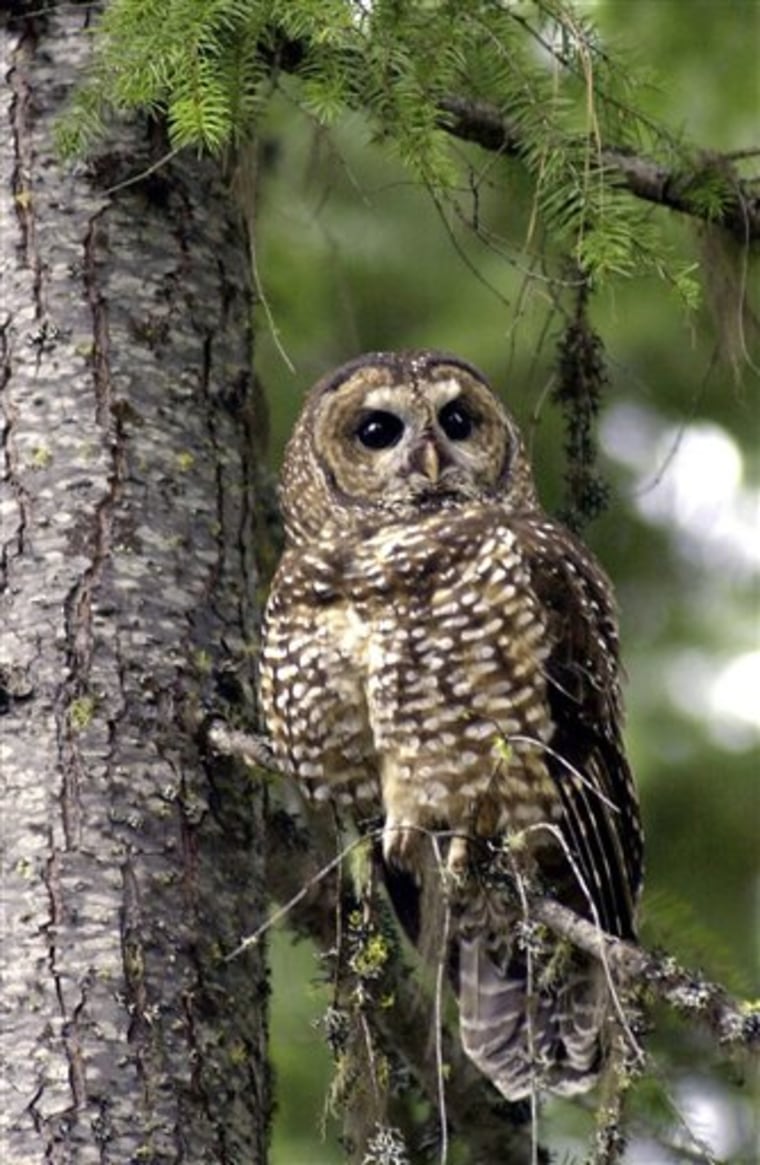A panel of experts found the Bush administration's plan for assuring the survival of the northern spotted owl was "deeply flawed" in its approach to protecting old growth forest habitat from logging and was not entirely based on the best available science.
According to the 150-page review obtained by The Associated Press, a panel of nine experts assembled by the Sustainable Ecosystems Institute in Portland found the draft spotted owl recovery plan underestimates the importance of protecting old growth forest habitat, compared to the threat from a competing species, the barred owl.
"We view the continued conservation of (old growth) forests to be paramount for Northern Spotted Owl recovery," the reviewers wrote.
The review was commissioned by the U.S. Fish and Wildlife Service after the draft owl recovery plan was flunked by two organizations contracted to do a peer review, the Society of Conservation Biology and the American Ornithologists Union. The Wildlife Society also found fault with it.
The spotted owl was declared a threatened species in 1990 due primarily to heavy logging in the old growth forests where it nests and feeds. While old growth forests suitable for owl habitat have increased, owl numbers have continued to decline, recent research shows. The spotted owl faces a new threat from a cousin, the barred owl, that has been invading its territory.
In 1994, the federal government came up with the Northwest Forest Plan, which cut logging in Oregon, Washington and Northern California by more than 80 percent while setting up old growth forest reserves to protect habitat for the spotted owl and salmon.
The Bush administration has been trying, largely unsuccessfully, to boost logging by changing environmental constraints against logging. The new owl recovery plan was initiated to satisfy a timber industry lawsuit over owl habitat and is an essential element in U.S. Bureau of Land Management plans to scrap the Northwest Forest Plan to increase logging in Western Oregon.
Habitat technique 'was wrong'
The review said the draft owl recovery plan does "not use scientific information appropriately" in some places.
"We identified several areas where we thought their science could be improved," Sustainable Ecosystems Vice President Steven Courtney, who led the review, told The Associated Press. "Some of those areas were relatively important. However, in other areas they did a pretty good job."
Among the failings, Courtney said: "The method they used to design the amount of habitat to be preserved, the technique used was wrong, was not based on good science."
The reviewers wrote that it can no longer be assumed that protecting old growth forests will protect spotted owls, due to the threats from the barred owl, but they added that for reserves to protect owls, they must be places owls are known to inhabit.
Criticism largely centered on increasing concern over the barred owl and de-emphasizing the need to protect old growth forest habitat from logging and wildfire.
Agency: 'More work' needed
Fish and Wildlife spokeswoman Joan Jewett said the owl plan was one of the most extensively reviewed in the history of the Endangered Species Act, and the points raised in this review and others are being taken into account in the final owl recovery plan to be issued next month.
"They've identified areas that need more work, and we are committed to doing whatever is necessary to develop the best plan," Fish and Wildlife Pacific Regional Director Ren Lohoefener said in a statement.
Democratic members of Congress from the Northwest and California have called for another round of scientific peer reviews of the final plan before it is adopted, noting that there were allegations of political interference from the Bush administration in the draft.
U.S. Rep. Peter DeFazio, D-Ore., said trying to obscure the importance of preserving owl habitat in the recovery plan would lead to a repeat of the "train wreck" of the 1990s, when lawsuits led to federal court injunctions shutting down logging.
"This decision will have huge implications for forest management in the Northwest and enormous repercussions for people who depend on these lands for their livelihood," DeFazio said in a statement. "The Fish and Wildlife Service must get this decision right, it cannot be rushed."
